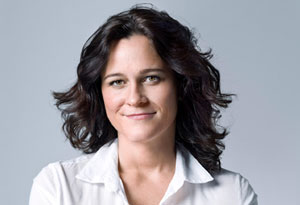The Unmasked Ball

Photo: Brigitte Lacombe
Bliss Broyard grapples with shades of color, choice, denial, and forgiveness.
Assembled for dinner in a historic hotel in New Orleans on the final night of the Broyard family reunion were more than 100 of my relatives. I looked around the room: How many we were and how varied—some raised as African-American, others as white. Some with pale skin, blond hair, and blue eyes; others dark with brown eyes and black hair, and then every shade in between. Most of them I'd never met before this weekend. Until the discovery of a secret shortly before my father's death 11 years earlier, I hadn't known they existed at all. On a Sunday afternoon in September 1990, my mother, my brother, Todd, and I sat on a stone wall outside the Dana-Farber Cancer Institute in Boston. My father, Anatole Broyard, the writer and book critic for the New York Times, had been hospitalized with prostate cancer for almost two weeks, and we'd just spent the last hour watching him suffer through bouts of pain so terrible that he'd cried out, "Help, help me!" as if he were drowning. After he finally fell asleep, my mother took Todd and me outside, saying we needed to talk. A few weeks ago we'd learned there was something about our father's childhood that had been kept from us; we'd been waiting for him to get out of the hospital to explain it. Now my mother said, "I think I better tell you what the secret is. Your father's part black."
I let out a startled laugh. "That's the secret?"
"That's it?" Todd asked.
"That's all," my mother said.
This revelation was nothing compared with the scenarios we'd been imagining: abuse or some other horrible crime. And after the soul-wringing exhaustion of watching a dignified man—my father whom I loved—yelling in agony, the news didn't seem like a big deal. In fact I felt exhilarated to learn my history and identity were richer and more interesting than my white-bread upbringing had led me to believe.
We asked my mother how black is he. With his blue eyes and pale skin, he didn't look black. She said that both his parents were Creoles from New Orleans—a term with many definitions—which in my father's case meant that he was of mixed French and black ancestry. She said that his decision to pass as white was part of his bid to become a writer; he feared being marginalized as a black writer, limited to addressing only black experiences. Also, white and black kids alike had bullied my father as a child because he didn't fit comfortably into either group. He wanted to spare his own children the same fate. My mother said that the reason we had no contact with my father's family was that they lived as black.
Two days later my father underwent emergency surgery. He survived another month, but the crisis caused something to slip in his brain. He never regained his lucidity, so there was no chance for him to explain why he'd made the choice he did. One day he fell into a coma, and very early one morning he died.
It wasn't until my father's memorial service that I grasped the fact that his being black was more than an interesting footnote to his life; it was a truth that had shaped his and my identity and destiny in ways I had only begun to imagine. There, in the rectory of the church, I met his younger sister, Shirley, and her son Frank, and for the first time in 17 years I saw my father's older sister, Lorraine. Of the more than 300 people who showed up at the church that day, my father's family were the only black people present except for one colleague from his office.
"During Jim Crow, many of my relatives who could pass for white did so—to get a better job, to send their kids to a better school, to go to the nicer, "whites only" beaches"



